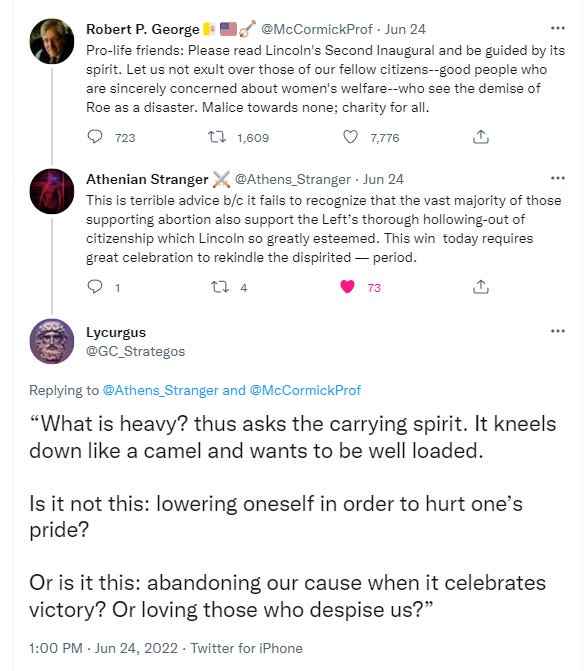Becoming Who You Are
There has been much talk in recent years about the “dissent right” — perhaps too much talk. Nietzsche says, “To become what one is, one must not have the faintest idea of what one is.”1 What means?
There is a powerful tendency to over-intellectualize every new and exciting phenomenon. Simply observe that we live in very intriguing and problematic times. A growing number of people are beginning to sense a great ugliness smothering their lives, and the average young man can smell the degeneracy in his politics and culture. This is not so grim as it is invigorating; a crisis invariably becomes a great point of interest. People desperately want to understand the causes of their present troubles, find a way out, and even have their hand in shaping the future. Adventures are waiting to be had and glory is waiting to be won!
Perhaps you do not see things this way. “What crisis? What civilizational problems?” You are quite comfortable in the present. Have you any depth? Do you desire anything beyond yourself? Perhaps you think the “dissident right” is some sort of LARP. Or maybe you just have a bad conscience about a people becoming who they are! Their longing for distant shores is an indictment of where you call home. What they are striving to become is a judgment against what you are.
The “dissident right” garners so much attention because they are a total rebuke of the dilapidated losers dominating the present. They seem to be the only people in our society sensible to the stakes and the need for great heroes. Perhaps you think this is all inordinate and over-zealous — it most certainly is. There are no heroes in the “dissident right” today, only critics with a friendly disposition towards the heroic. But “the fact that a person resists the whole spirit of his age, stops it at the door, and calls it to account, must exert an influence! It is indifferent whether he wishes to exert an influence; the point is that he can.”2
All zealous rhetoric aside, we can know one thing: there are no other people hearing this call to adventure and so unashamed to think heroically.
The doubters will claim: “These people do not know how to build anything. They only have an eye for destruction. The dissident right is just nihilism!” It is true: the “dissident right” is full of Zarathrusta’s beloved despisers — nowhere else will you find a more comprehensive deconstruction of modern decadence or see the current regime so artfully embarrassed. But the “dissident right” is not simply a reactionary Dionysian force, there is also this burgeoning creative energy — an Apollonian will to undergo new valuations, set new goals, and venture beyond the Iron Prison. The beginning of a destiny is taking shape in ways nobody fully understands yet.
I may have just proven my point about how easy it is to over-intellectualize every new and exciting phenomenon, but I do not know if the “dissident right” will be able to escape this. Against the cold-grey backdrop of hegemonic liberalism, they are the only sign of life pulsing through Western civilization today. The “dissident right” is simply too joyous and too electric to ignore, and people with mixed intentions have been pouring in to drop their take and find an angle to either praise or condemn.
Ironically, in trying to understand the phenomenon of the “dissident right” we might be getting in the way of its becoming. Even among like-minds, all of this analysis will lead to petty feuds, battles over interpretation, and general confusion. Do we need more analysis? Probably not! I feel that we should be making new declarations and writing exhortations. We must command and exclaim in the vocative! The “dissident right” does not need a new cadre of thinkers to Socratize this fire — for now, they need great comics like Aristophanes and poets like Tyraeteus. In time, they will find their great statesmen and lawgivers too.
For this reason, I was hesitant to sit down and write this. I have found some consolation in knowing that while I am no great comic or statesman, I am no great thinker either. So perhaps I can indulge myself one last time without causing too much harm. My intention is not to dissect the “dissident right” but to present what it has to offer in a way I find convincing.
A Metamorphosis of the Spirit
The “dissident right” is a terrible name. I use it for simplicity’s sake because it is something most people can latch onto, but each word in the name is problematic. In the first part, “dissident” just comes off as some generic anti-establishment reaction. Everywhere, there have always been people shaking their fists against established powers. In the next, “right” is just one end of the ideological spectrum. The “right” and “left” are modern inventions that have done more to stunt our understanding of politics and culture than progress us forward. Under this name, the “dissident right” simply communicates an ideological reaction against the status quo. If I had the power, I would eliminate the name “dissident right” and simply say “sensitive young men.” However, for the purpose of this article, I will keep the name so long as we try to convey a more complete understanding.
I understand the dissident right as men that are undergoing a transformation of spirit. Not everyone ends up in the same place and many err along the way, but it is still a transformation nonetheless. The impetus behind this is simply the gravity of our age. Take a look at any dimension you want: politically, economically, culturally, spiritually, physically, civilizationally — from all around, serious problems are bearing down on us and people are feeling a tremendous weight.
There are certainly more extensive genealogies that can explain the cause of all this weight, but the most direct story begins with the establishment, the Global American Empire, or Liberal Democracy, which all describe the existing order or the regime we live under today. After the end of the Second World War, the victorious elites in Western nations stood-up new totalizing systems of governance and control that now stretch across the globe. This has led to the declaration of new aims for humanity, the telling of new narratives, the flourishing of a certain type of person, and the esteeming of certain “virtues.” In recent years, a growing number of people are finding themselves in fundamental disagreement with this "post-WWII consensus." They see it as a brutal leviathan consuming the individual, weakening the nation, and threatening the future of Western civilization.
I see two possible reactions against the existing order: The first is the load-bearing or carrying spirit. These people will load all the weight of the current epoch onto their backs and march dutifully into a desert. The best way to deal with the weight of the present is to shoulder it nobly. For the carrying spirits, a leviathan is something to be endured. Alternatively, there is the fighting spirit. These people will leave the isolation of their desert, shrug off all the weight placed upon their backs, and unknot their stomachs in preparation for the trials ahead. They are on the hunt to win freedom and secure space for new creation. The best way to deal with the weight of the present is to confront it nobly. For the fighting spirits, a leviathan is something to be overcome.
For a long time, the “progressive” left has taken on the fighting spirit, and the conservatives (or the “traditional right” and “classical liberals”) were all very comfortable being the carrying spirits. But since the left has now secured its hegemony over politics and culture, the conservatives have not enthusiastically moved from their deserts to become the fighting spirits. Many have been bearing so much weight for such a long time that they have lost the will to fight. It is as if they were trapped inside the belly of a whale — more unwilling than unable to escape. A dissident is born when he sees this and thinks to himself, “These people are weak losers. I do not wish to be devoured with them!” The dissident understands the weight of hegemonic liberalism but feels no obligation to shoulder it any longer. He becomes a fighter.
Naturally, conservatives do not like when young men abandon the carrying spirit and become fighters. They will continually attack and slander the dissident right as “mere reactionaries,” but this makes little sense. The traditional conservative right and the new dissident right are both “reactionary.” The former reacts to hegemonic liberalism by shouldering it while the latter reacts by confronting it. The question is not so much “Who is reactionary?” but “Whose reaction is better?”
The carrying spirits have nothing good to offer. What is the goal of bearing all this weight on their backs? Do they think they will just outlast the leviathan and be there in the end to usher in a new beginning? Do they retreat into their desert to find peace staying resolute in their principles during these chaotic times? One can find peace in a desert but does that make deserts desirable? Wandering alone under the blazing sun, laden with this tremendous weight, their backs begin to break. The carrying spirits betray their destiny and fail to become fighters.
But they cannot see what has happened! While they lay broken on the ground a mirage of delusion visits them and serves as a kind of narcotic to soothe the pain caused by their pointless self-inflicted labors. The carrying spirits lift up their heads and smile at the sight of this mirage. In it, they see themselves as some noble man standing tall and shining amongst the ruins. But there is no man, only ruins. In fact, it is the regime that stands tall and triumphant over the broken man. The carrying spirits become so enamored by the sight of their own “virtue” they cannot understand it is they that constitute the ruins! The man inside them, not “the old society and its traditional way of life” is what has been pulverized into dust.
Most importantly, the reaction of the fighting spirit is superior because it is the only option that unlocks the door to the possibility of new creation. It is this fact, more than any other, that drives the carrying spirits mad. They fear that if the fighting spirits succeed and become the masters of their fate, these victors will be in a position to create new values, become a new people, and constitute a new regime. The “virtue” of the carrying spirit is to endure the leviathan not to overcome it! The carrying spirits have fallen so in love with their “virtue” that victory for the dissident right would be catastrophic. It would be like dropping a psychological nuclear bomb! This would completely vaporize their fantasy of being the “noble man amongst the ruins.” A carrying spirit with no weight to bear, a conservative with no ruins to stand amongst, a world that can no longer be denied, a fight that must be fought, a destiny crying out to be affirmed is a chasm they simply cannot look down into. So the potential for genuine creation is simply not accessible to such people. The only thing carrying spirits are capable of creating are bridges over the River Kwai: monuments to their own delusions of “virtue.”
All of this is to say that the dissident right is not an ideological reaction but a forward-looking force in the most complete sense. These men are the cyclopes of culture and pathmakers of humanity. They are the great pain-bringers, the yes-sayers, the “rising generation with an undaunted gaze and heroic proclivity for the tremendous.”3 They can move beyond mere ideological reaction and constitute a new more complete archetypal phenomenon. On the one hand, they are deconstruction: a chaotic flood storming in to wash away old and decadent structures. On the other hand, reconstruction: a creative spark inspiring such men to build new structures in honor of the true, good, and beautiful. What we see here are not men possessed by ideology but the oscillation and dance of a new type of higher man. One that speaks only a sacred “yes” to both destroy what ought to be destroyed and create what ought to be created. Yet within all of this, they remain funny, joyous, and mere esteemers of humble truths. In total, I see the dissident right as:
The frolicking of returning energy, of newly awakened belief in a tomorrow and after-tomorrow; of sudden sentience and prescience of a future, of near adventures, of seas open once more, and aims once more permitted and believed in.4
Total War Against You
It should be obvious that our regime wants nothing to do with this “returning energy.”
The greatest labour of human beings hitherto has been to agree with one another regarding a great many things, and to impose upon themselves a law of agreement—indifferent whether these things are true or false.5
Against this measure, our regime has had Herculean success in imposing such universality of belief. Whether this was by design or just a catastrophic string of accidents managed reactively by the post-WWII regime does not really matter. The fact remains: we now have a pantheon of new idols to worship and clever priests manipulating the normie-NPC-horde into having this non-voluntary way of forming opinions. Proof of their success can be found by looking at the popular opinion on any fundamental issue: natural hierarchies, nationalism, border security, gender, health — too many people are all around under a perverted psychosis. Common sense has been colonized by deranged freaks! So again, it should not come as a surprise that the existing regime does not take kindly to a dissident right committed to building something new atop the ruins of all their grand labors (or fortuitous accidents). They view the dissident right as a kind of “insanity” hovering above their established order ready to smash their sacred idols and strike down their solemn “truths.”
It is not truth itself that the dissident right is at odds with — it is not even the “universal obligatoriness of truth” that Nietzsche found so distasteful. The “dissident right” is at odds with their truth — the regime’s particular obligatoriness of belief. And it’s not just a disagreement but disgust with the regime’s dominant beliefs. This deep disgust is a sign of some sort of lively creative force within the dissident right — something inside them wants to live and affirm itself. The regime has no way of possibly understanding what this is, but we can sense a primordial tempo pulsing through and captivating more and more people. If the drum of this tempo speeds up, a downright delight in delirium could break out and ruin everything for them. So the regime must terminate all of this and deny the soul of the dissident that desires to break out and affirm itself.
Winston Churchill had a nice saying: “It is at once the safeguard and the glory of mankind that they are easy to lead and hard to drive.”6 It is relatively easy to lead people into a bad place, but it is very difficult to drive them into total acquiescence for long periods of time. Eventually, the game of convincing people to mistake the ugly for the beautiful and to value weakness as strength gets exposed. Up until our current crisis, mankind might reasonably rely on this natural safeguard to protect civilization from devolving into a dead-end dystopia. There was never a reason to doubt that the indomitable fire inside man would continue fueling dissidents in their revolt against the established order. But our particular regime presents a new existential challenge. The logical end of liberal democracy and the post-WWII consensus is a sort of transhumanism aimed at not just breaking dissent but eliminating the possibility of all future dissent. They do not want to just contain or oppose the creative energy brewing in the dissident right today but are moving to completely break and annihilate it forever.
The consequence of pursuing this end is a regime that wages total war against its citizens. Politically, spiritually, and physically, the citizens are being reduced to caput mortuum — a dead inert mass. I genuinely do not mean to be hyperbolic, but just look around and try to be honest with yourself. It is not my task here to paint this ugly picture, but it’s Zarathustra’s Last Man through and through. Technology, both what exists today and what is emerging on the horizon, is the one factor that makes our situation so uncertain and dangerous. There can be no great striving; there can be no visions of distant shores — the continued success of liberal democracy, which means progress towards a grey transhumanist dystopia, threatens to crush the human spirit. What we are faced with can poison life for years ahead, for thousands of years ahead.

The dissident right is so important because it is the only way out. It is the only remnant of Western Civilization still pulsing full of life and possessing the heroic belief required to overcome the circumstances of the present. A frightening Dorian spirit is alive and storming within the hearts of dissidents; it hovers above the regime like a kind of Nemesis waiting to descend down and break through all that was previously sealed off. Today this spirit is disorganized, chaotic, and still finding its form, but there are some pioneers scouting the path ahead. They are pushing open the doors to grand politics and charting pathways to lead mankind on new exciting adventures. A noble destiny beyond the Iron Prison of liberal democracy is being imagined and starting to take form; a tremendous striving is underway to escape the longhouse and “launch the spear of mankind beyond that of a domesticated ape.”7 The citizens of our nation are not yet a dead inert mass, and these pioneers are all competing for the glory of revitalizing the citizenry and setting them afire with a great task for which they could unite.

Not A Movement
It is easy to stumble across the dissident right and get confused. You hear about all this energy and talk of heroism but where is everyone at? All you can see is a bunch of people online ripping on the regime or arguing with each other. I hear many ask:
“Where is the genuine political challenge to liberal democracy?”
“Where are these pioneers?”
Who is leading this thing?
“Why isn’t anyone doing anything?
“Where’s the movement?”
Understandably, many normal people are starting to sense the total war being waged against them, they have growing contempt for the kind of people lording over their lives, they do not enjoy watching their country be run into the ground, and they want something to be done about it. So while these questions often come from a noble desire, they reflect a misunderstanding of what the dissident right actually is. The dissident right is not a movement. As I mentioned in a prior section, the dissident right just broadly refers to men that are undergoing a transformation of spirit. And the most tantalizing thing about this is that individual transformation does not run in parallel with political transformation.
Political transformation requires a confluence of luck, circumstance, style, and sheer human will. A real movement that affects historic change is definitely possible but it’s like catching lightning in a bottle. Developing into a fighter, becoming a dissident, and finding some truth in this world of lies is not necessarily going to change anything beyond yourself. There are people that have gone through this transformation many years ago, and then there are some that are just now figuring things out. Generally, the newcomers are the most disruptive and their naivety can be both a blessing and a curse. In some cases, they can bring new energy and a breath of fresh air, but more often they rush into panicked half-thoughts. Desperation for The Movement creates mOveEMEnTs that will be mocked and torn to pieces. But there is also danger with the other side who have been dissidents for many years. Too much time staring into the abyss can overdose the spirit on cynicism and convince some into believing that every attempt at a movement will inevitably turn out to be fake and ghey.
There are also many factions that come at the regime from various angles and all possess different priorities, interests, and opinions pertaining to proper ends and means. The dissident right can splinter off in a hundred different directions based on their views of religion, their emphasis on certain philosophic ideas and historical eras, or their fascination with different national leaders, books, movies, musics, aesthetics, and also lifestyles. Among these factions, there is general agreement that liberal democracy is bad and our civilizational trajectory is not good but no real consistency beyond that.
If the movement so many people desire can be thought of as a star, the dissident right would be a kind of nebula. Here, we find ample substance but no glowing sun has yet taken form. This may be frustrating for some to hear, but it is what it is. In the dissident right, ideas come and go, factions rise and fall, and personalities can self-immolate and fade away. How many bastard movements have prematurely sprouted up only to crash and burn? How many individuals have been embarrassed and compromised in their striving to become a star? How inordinate were some of the expectations for presidential populism under Trump? How many have we seen clamoring in vain to represent the “real” right-wing?
Pariahs, grifters, and pointless organizations abound — the things that take shape may not always be the brilliant star we know is possible. But despite the inconsistent form and motley substance, it is the potential that makes the dissident right so interesting and important: As long as our current regime exists and the spirit of man is not universally broken, there will be some individuals that undergo a metamorphosis. They will sustain a critique against the regime and find ways to express their vision for the future. They will attempt to call forth the right people, under the right circumstances, in a way to ultimately challenge the regime and secure victory over it. One organizing genius with some heavy plans — the force of gravity — is all that is missing!
If you pay attention at all, it should be obvious that the anons of frog twitter are the best thing happening on the dissident right. Dionysians par excellence, the frogs take great joy in their deconstruction and sustain the most cutting critiques against the regime. They are masters of mockery not slaves to sincerity. “Who are they? What are their goals? What are they doing online posting #HandsomeThursday pictures one day and quoting Nietzsche the next?” Hard to say, nobody really knows! “Goals?” Who cares? Like Hippoklides, they are here to have a good time! It is this spirit that makes them funny, light, and elusive — ideal samizdats.
“I thought the dissident right required weight and gravity to engender a movement? Why do we care about these insincere people?”
From a distance (and especially from a traditional conservative perspective), the frogs appear to be like those little malevolent demons Jordan Peterson is always wailing about. It is only by taking a closer look that their virtues become apparent. More than anyone else, the frogs have a heightened sense of our current situation — they know the board well, and they can see what pieces are working for and against them. They know the nature of this regime, the challenges it presents, and how we arrived at this particular point in history, but they are not vexed by it at all — they are not desperately itching for a movement just to say they have one. They understand their Dionysian role and have their Apollonian longings under control — they never appear to be grasping for more than what is within their power. By having fun and not taking themselves too seriously, they have developed good instincts. As a result, the frogs are like white blood cells within the dissident right cleaning up trash and detecting any signs of weakness or hostile infiltration. Only the truest and best solutions can pass their shit-tests. Every fake idea and ill-thought half-measure is stripped bare, held up to the sky, and then hurled down a Lacadamonian ravine to the crescendoing sounds of Stauss’ Blue Danube.
It is also a mistake to confuse their artful mockery for superficial trolling. The frogs are superficial - from profundity! More than just meme-poasters, they are capable men, readers of primary texts, and appreciators of history (employing monumental, antiquarian, and critical history all in the service of life!) Their mockery is not just surface-level — they are in fact taking a tuning hammer to the regime’s most sacred idols. Their strikes are exposing these idols to be deformed and hollow — no harmonious tone rings out and the notes fall flat. The frogs have discovered that these idols are not even well rooted in the minds of many— they wobble if given a little push!
In total, the frogs will never be the movement so many desire to see come out of the dissident right. Their nature is Dionysian and they will never cease being Dionysians. They are never going to plant a flag in the ground and say, “Here we are!” They will correctly laugh at you for such an absurd suggestion. Do you expect a scattered field of online anons to do something politically? What is wrong with you? It is not their role to challenge the regime politically. Their role is to sustain critiques against the regime in the most convincing and creative ways possible. Over time this might result in some damming of strength. So from something light and mischievous, something heavy and terrible could be brought forth— monsters out of time: an Alexander, a Washington, or a Napoleon. A great man, or band of great men, might one day emerge having some interaction with the frogs, but they will forge ahead independently, under their own flag, and with their own vision and political mission.
I say to you: one must still have chaos in their soul to give birth to a dancing star.8
Must the next Apollonian outburst in the monumental history of Western civilization originate from a drunken Dionysian wellspring? If so, frog twitter must be playing some role in that. At a minimum they might be treading the grapes and preparing the wine that will help induce greater men to let fly the arrows of their longing.
“Who rules?”
Nobody wants to be a dissident forever. The goal is to win, and for some dissidents on the right, their destiny is to rule. But between these men and their destiny rests a tremendous weight to be overcome — a formidable regime, an uninspired people, cultural rot, and the feeling of nihilistic exhaustion. The dreaded “How?” hangs above the head of every dissident and judges them harshly. Many turn their backs for obvious reasons: they don’t want to make fools out of themselves by getting the “How?” wrong. As a result, some turn to become heralds of the future. You will hear them cry Caesar! Civil War! The Great Flood! Rebarbarization! Local Tribalism! Mars! Parallel Institutions! But in these noises, you can hear their will turn against life. Pathways to the immediate future go unnoticed and opportunities for daring action become unintelligible because these heralds have their hearts invested in another world that does not exist. What happened to the thrill of an escape? Where are the men devoted to devising grand schemes and cunning plots? The predictive power of these heralds has not yet become a strategic, tactical, and organizing power that can be aimed directly at the regime:
“Don’t bother me with that! I am too busy divining the future. My portrait of the American Caesar is almost finished. My theory on parallel institutions is almost perfected. I am about to figure out how to successfully teraform Mars.”
The gaze of these heralds is blurred and stunted by this otherworldliness. A true and tangible “How?” has not yet even been imagined.
Then there are the legions of dedicated analysts. These men turn their back on the “How?” by obsessing over every other question:
“What is the nature of this regime? Where did it come from? Who are the key players? Why are they doing this? When will their power start to unravel?”
Their desire to understand knows no bound and it shoots out desperately in every direction thirsting for more knowledge. They scour history, from ancient Rome to Rhodesia and from Heraclitus to Kaczynski, looking for useful parallels and creating extensive genealogies to explain every circumstance of the present. They dive into art, literature, and film hoping to glean that one key, decisive insight. Every conspiracy is placed under the microscope, and careful accounting is kept on each actor and every potential motive. Symbols are detected, patterns recognized, and threads have turned into full essays on every subject imaginable: On Women, On MK Ultra, On Aesthetics, On Herodotus, On Bio-Leninism, On Lana Del Ray.
These analysts want to piece together the great puzzle, but its complexity seems to only increase in proportion to their will to further understand and solve it! This will to truth, the striving to understand the cause of our peril, to understand the nature of the regime, its history, its corruption, its lies — it is a will to death. If any truth were to be found what would its value be? What difference would it make if the regime had a dozen more secret agencies operating against the American people that we didn’t even know about? Or if the “elites” were actually one hundred times more maniacal than we currently suppose today? What prize do you win for completing the most accurate and perfect genealogy that explains it all from beginning to end? The year is 2025 and Matt Taibi just dropped part 852 of the #TwitterFiles exposing the ugly relationship that exists between private tech companies and the deep state security apparatus — who cares? Let’s say we expose all of Biden’s corruption, prove COVID was a deliberate attempt to establish bio-medical tyranny, that Ukraine was just an international money laundering op, and everything about Epstein was true. Imagine if you had the smoking guns to all this, and you got to post the threads. You would get likes, create buzz, appear on TV, and do some podcasts, but the “How?” would still remain.
Both these heralds of the future and the legions of analysts are important. They are the people sustaining the dissident right as a culture. But it should be reiterated: nobody wants to be a dissident forever. This is not a culture anyone should wish to preserve and pass on to the future — the Iron Prison is to be overcome not endured. The whole hope of cultivating this culture is to have something great come forth from it, and if the destiny of the dissident right is to rule, the “How?” must be figured out. Perhaps it just comes down to getting the best people to focus on developing a political solution (despite how that term might make them feel).
This is what I foresee: — The will to win, to not grow old and die dissenting against this regime, is strong. As the dissident right matures and external circumstances continue to play out, their current culture defined by prophecy and protracted analysis will come to a close. No longer will so many be distracted by vapid theories and a multitude of petty outrages. The noise will dissipate and there will be a moment of great quiet — a divine sense of clarity will begin to strike the most ambitious and cunning men. Politics will be rendered down to a very simple question for them: “Who rules?” And the current answer to that question will also make itself equally clear: “Not us.”
From here they will take hold of just a few facts, affirm their small humble truths, and move forward with clarity and conviction. They will tear down the “How?” hanging above every dissident’s head and begin drawing their plans upon it. They will enthusiastically, and against all pessimism, tackle the political solution because it is their destiny to do so. They will find a way! I predict these pioneers will come from the best corners of the dissident right, maybe some of the frogs. I believe they will begin their work by combing through their fellow citizens and surveying the landscape. They will create portraits of the kind of man worthy of the honor to rule. They will find the organizing geniuses, the great architects, the type of men who could unlock and throw open the doors to grand politics. They will sing songs about such men, entice them, and even organize them. With minimal effort, the right people may even begin to organize themselves and a proper political solution in response to this regime will become possible.
Friedrich Nietzsche, Ecce Homo (Why I Am So Clever, § 9)
Friedrich Nietzsche, The Gay Science (Book III, § 156)
Friedrich Nietzsche, The Birth of Tragedy (§ 18)
Friedrich Nietzsche, The Gay Science (Preface, § 1)
Friedrich Nietzsche, The Gay Science (Book II, § 76)
Winston S. Churchill, Mass Effects in Modern Life
Excerpt from Caribbean Rhythms, Episode 103
Friedrich Nietzsche, Thus Spoke Zarathustra (Prologue)










Superlative. Read this in between sets at the gym, Amon Amarth in my headphones. This is writing to lift by. You see clearly and far, and have articulated the essence of the Vitalist Renaissance (for such I believe to be a truer label for the inner spirit of the mislabeled dissident right) as well as I've ever seen it illuminated.
Great piece.
I think the tension you outline regarding the proper prioritization of discourse vs ‘action’ is very real. It is striking - I would argue worrying - how stark the imbalance of intellectual to practical output from our sphere is. Debates rage, but little physical evidence results.
Your piece has made me reconsider the proper role of our sphere though - I take your point that it is not correct to interpret the frog phenomenon as a crude platform for structured political mobilization, but as an emergent, reactive expression of vitality, playfulness, and inquiry.
On the other hand, there comes a point when action is necessary. I don’t think it’s enough to wait for a rightwards shift in the ‘collective consciousness’, as this smacks of a liberal democratic belief about how society functions.
The question then becomes - is there a proper mode of action for us somewhere between Twitter posting and becoming a capital-m ‘Movement’? I think the answer is yes; this is demonstrated (in a small way) by our recognition of the importance of bodybuilding. Bodybuilding is evidence that the spirit of the sphere actually orients us in the real world towards beauty and vitality; that all of this is more than terminally online Twitter discourse.
What’s the next step after bodybuilding? There’s a danger in setting our targets too low, in reassuring ourselves that if our mockery of the sitting elite is good enough that ‘men of power’ will emerge, even if we haven’t built the foundations for these men to achieve anything, like economic networks, like localities populated by strong and faithful men, etc. We can’t just be scholars sitting in our Twitter monastery.
But - like bodybuilding - these actions must be a continuation of the spirit of the movement: playful, vital, beautiful.
‘Political solutions’ are only distasteful if you conceive of politics in an entirely modern mode, as ‘democratic party politics’. If we widen our historical lens and view politics in a more age-agnostic fashion as merely the cultivation and wielding of power (in all its subtle modes), its attraction becomes more apparent.
I’m experimenting with some of these actions in my own life, and will document the results in my own writing. Thank you for the inspiration and for the great article.